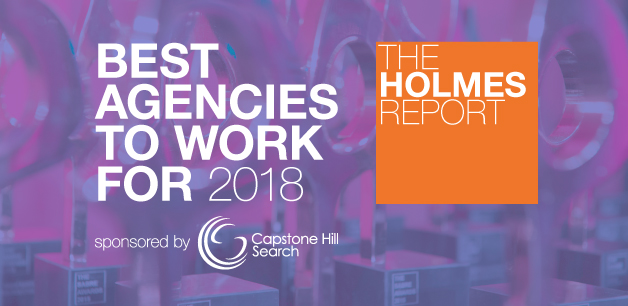
 Podcasts
PodcastsCatch the latest PR news & updates with PRovoke Media's PR Podcasts. Lifting the lid on key industry stories & trends, join our listeners of PR podcasts today.
 Videos
VideosLatest video interviews and campaigns from PRovoke Media, previously known as the Holmes Report.
Long-form journalism that analyzes the issues, challenges and opportunities facing the business and practice of PR.
 Profiles & Interviews
Profiles & InterviewsExplore PR profiles and interviews with leaders from the marketing and PR worlds.
 Crisis Review
Crisis ReviewPR Crisis & Business Crisis review. PRovoke Media's annual analysis of the top reputation crises to rock the corporate sector. Read on here.
 Coronavirus
CoronavirusPRovoke Media's coverage of the Covid-19 crisis, focusing on corporate communication, public affairs & PR industry fallout.
 Trend Forecasts
Trend ForecastsPRovoke Media's PR Trends round up. PRovoke Media's annual forecast of PR trends and news that will impact the PR world in the year ahead...
 Social & Digital
Social & DigitalDedicated to exploring the new frontiers of PR as it dives deeper into social media, content and analytics.
 Technology
TechnologyOur coverage of key technology PR trends and challenges from around the world of digital communications.
 Consumer
ConsumerFrom brand marketing to conscious consumerism, coverage of key marketing and PR trends worldwide.
 Employee Engagement
Employee EngagementPRovoke Media's coverage, analysis and news around the rapidly-shifting area of employee engagement and internal communications.
 Sports Marketing
Sports Marketing Sports PR news, diversity & inclusion trends, views and analysis from PRovoke Media. Subscribe today for the very latest in the world of sports communications.
 Global PR Agency Rankings
Global PR Agency RankingsPRovoke Media's definitive global benchmark of global PR agency size and growth.
Enter PRovoke Media's 2024 Global 250 Agency Ranking and/or our Agencies of the Year competitions now.
 Agencies of the Year
Agencies of the YearPRovoke Media's annual selections for PR Agencies of the Year, across all of the world's major markets.
 Innovator 25
Innovator 25PRovoke Media profiles marcomms innovators from across North America, EMEA and Asia-Pac.
 Creativity in PR
Creativity in PRIn-depth annual research into the PR industry's efforts to raise creative standards.
 Asia-Pacific Communication Index
Asia-Pacific Communication IndexAPACD/Ruder Finn annual study of Asia-Pacific in-house communications professionals.
 SABRE Awards
SABRE AwardsThe world's biggest PR awards programme, dedicated to benchmarking the best PR work from across the globe.
 PRovokeSummit Global
PRovokeSummit GlobalThe biggest PR conference of the year, a high-level forum designed to address the critical issues that matter most.
 PRovoke Media Regional Series
PRovoke Media Regional SeriesA global network of conferences that explore the innovation and disruption that is redefining public relations.
 Agencies of the Year
Agencies of the YearUnrivalled insight into the world's best PR agencies, across specialist and geographic categories.
 Roundtables
RoundtablesOur Roundtables bring together in-house comms leaders with PR firms to examine the future of communications.
 Agency Playbook
Agency PlaybookThe PR industry’s most comprehensive listing of firms from every region and specialty
.jpg) All Jobs
All JobsFind the latest global PR and communications jobs from PRovoke Media. From internships to account executives or directors. See all our PR jobs here.
PRovoke Media's editorial series published in collaboration with partners.


About/FAQ | North America 2018 | EMEA 2018 | North America Summary
By Aarti Shah
Last year, we explored the portrait of a US PR professional and unearthed, unsurprisingly, the typical PR employee is female, well-educated, relatively young and mostly white. Perhaps even more unsurprisingly, not much has changed in 12 months.
This year’s survey included more than 5,000 adult PR professionals in the United States who participated in our Best Agencies to Work For survey between January and March 2018. Upon aggregating these responses, which came from boutique agencies to multinational players across markets all over the US, a picture emerged of the current state of the industry’s demographics. (You can read more about the methodology that our research partners Rockland Dutton Research & Consulting here.)
It’s worth noting, there’s some inherent sampling bias here, as the 50+ firms that opted to participate in the Best Agencies to Work For survey are presumably confident about their organization's culture and engagement (and their employees likely took the survey with the goal of winning recognition). It’s possible the findings would paint a less rosy picture if we had surveyed the industry at large. But even so, the scores for this year’s participating firms ranged from 20 points below average to more than 10 points above average, meaning there’s a wide range of perspectives represented among this sample.
This year’s data shows a 3-point increase in the number of women in the industry with 74% of respondents identifying as female (25% identify as male, meanwhile 1% opted as non-binary/third option). Notably, about three-quarters of the PR industry falls between the ages 22 and 37, making the overall makeup of the industry remarkably young. Last year, this age bracket represented 65% of the workforce — and those in the next age range (between 38 and 55) make up about 20% of the workforce, down from 33% in last year’s survey.
“Now having done this exhaustively for the last two years and determined that PR is dominated by young white women without a great deal of attention age, gender or color diversity - the trend over year over year is that we haven’t built a workforce that most resembles the American public,” said David Rockland, partner/CEO of Rockland Dutton Research, the firm that oversaw the data analysis for Best Agencies to Work For.
Even so, the numbers point to some progress around diversity. Last year, we called the industry astonishingly white with 83% identifying as white — this year, 79% identify as white. Meanwhile, the numbers for Latino, Asian-American and black this year are 6%, 4% and 3% respectively with the remaining opting for “other” or not answering.
“No matter how you cut it, the industry is nowhere near representative of the American public — yet we are in the business of public relations,” Rockland noted.
Jamie McLaughlin, founder and president of Capstone Hill Search, noted there’s been a “trickle-down effect” as companies like Lenovo and HP have required diversity among their agency teams.
“This is such a hot topic of conversation that the entire industry is more switched on,” McLaughlin said. “And many might be seeing the proven correlation between diversity and increased performance and revenue. But do we get asked to include racial diversity in our searches? Almost never. We do get asked to do this around gender though.”
When it comes to salaries, the respondents generally earn less than $125K with 80% falling within that range. Breaking this down further, 21% of respondents earn less than $50K, more than half fall between $50K and $125K, with another fifth earning more than $125K.
“There is a natural pyramid within agencies, so it’s not surprising that you see a lot of people hit the $125K mark and leave the industry,” McLaughlin said. “And many often go in-house when they’ve done five to six years on the agency side and have that $120K salary.”
He noted, the dearth for agencies right now seems to be at the VP or SVP level within highly-regulated sectors like healthcare and financial services.
Meanwhile, 90% or more of the survey respondents say they are proud to work for their agencies, would recommend their agency as a great place to work in communications and would recommend their agency as a great place to build a career. This satisfaction is also reflected in individual career trajectories with 90% saying they understand how their role contributes to the success of their company. While engagement was high across all agency sizes, PR professionals at mid-sized and large agencies tend to be slightly less engaged than those in small or boutique agencies. Yet even so, only 82% say they want to say at their company for another 12 months.
McLaughlin said flexibility has the strongest impact on an agency’s retention record. Employees, for instance, who have earned the ability to work from home a few days per week are less likely to abandon that benefit — knowing it’s unlikely to be a benefit at a new firm right away.
“People are willing to work extraordinarily hard,” he said. “But they don’t want to be in an office all day doing it.”
Employees are happiest when they have been at their agencies for more than five years or less than three years. Agencies are at the greatest risk of losing talent between three to five years at the firm.
Other notable insights from this year’s survey includes:
Diversity and Inclusion
• Acceptance of different types of people is moderate, as 54% of PR professionals agree you don’t have to be a specific kind of person to fit in at their company.
• While PR professionals across the industry believe their agencies do a good job of empowering women in leadership (93% agree), fewer (69%) see opportunities for employees 50 and older at their current employer.
Harassment
• Almost all PR professionals (95%) agree that harassment is not tolerated at their firm.
• Employees feel empowered to speak about sexual harassment, as 96% of PR professionals say they feel comfortable reporting sexual harassment by a client or colleague to their boss.
Career growth and opportunity
• Three-in-ten (30%) PR professionals don’t feel they understand all the career opportunities at their current agency.
• Talent retention continues to be difficult, especially in large agencies. While about eight-in-ten (84%) boutique employees find their agency does a good job at retaining talent, fewer employees in large agencies agree (69%).
About/FAQ | North America 2018 | EMEA 2018 | North America Summary



The PR industry’s most comprehensive listing of firms from every region and specialty.






Intelligence and insight from across the PR world.
About PRovoke Media Contact Us Privacy & Cookie PolicyWe feel that the views of the reader are as important as the views of the writer. Please contact us at [email protected]
Signup For Our Newsletter Media Kits/Editorial Calendar Jobs Postings A-Z News Sitemap© Holmes Report LLC 2024